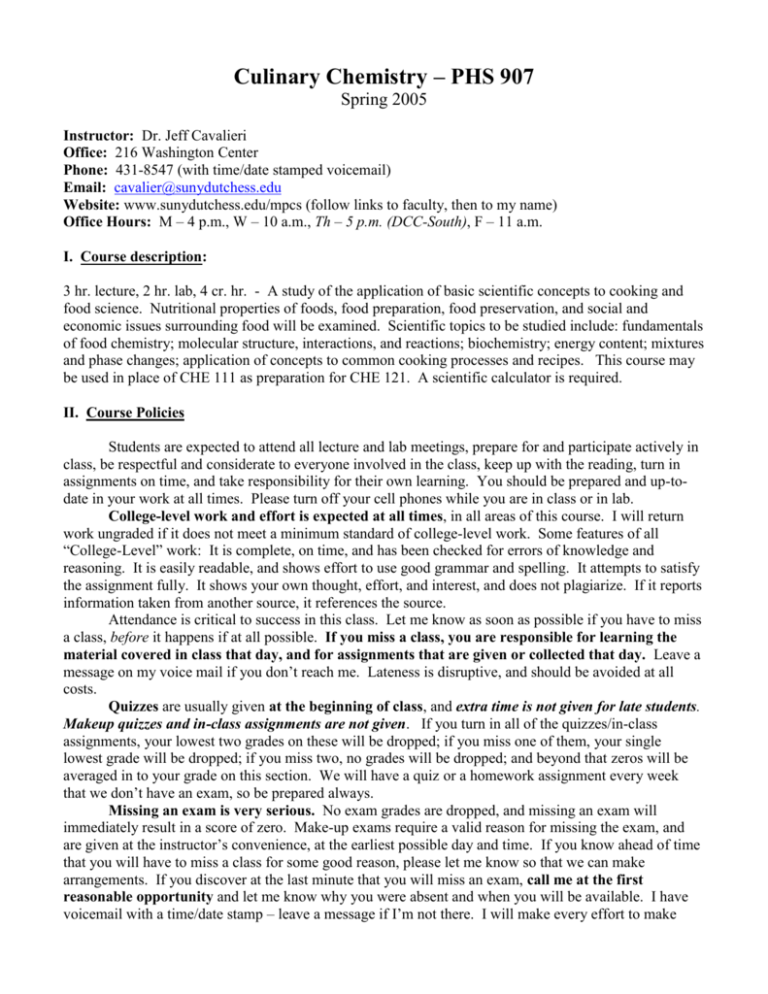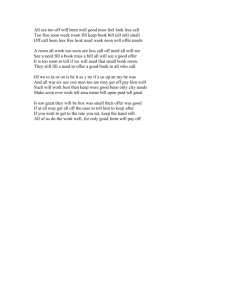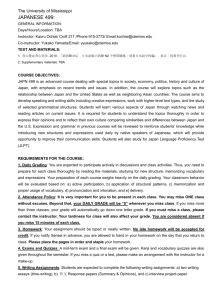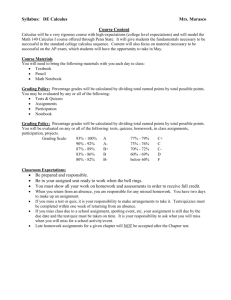Culinary Chemistry – PHS 907
advertisement

Culinary Chemistry – PHS 907 Spring 2005 Instructor: Dr. Jeff Cavalieri Office: 216 Washington Center Phone: 431-8547 (with time/date stamped voicemail) Email: cavalier@sunydutchess.edu Website: www.sunydutchess.edu/mpcs (follow links to faculty, then to my name) Office Hours: M – 4 p.m., W – 10 a.m., Th – 5 p.m. (DCC-South), F – 11 a.m. I. Course description: 3 hr. lecture, 2 hr. lab, 4 cr. hr. - A study of the application of basic scientific concepts to cooking and food science. Nutritional properties of foods, food preparation, food preservation, and social and economic issues surrounding food will be examined. Scientific topics to be studied include: fundamentals of food chemistry; molecular structure, interactions, and reactions; biochemistry; energy content; mixtures and phase changes; application of concepts to common cooking processes and recipes. This course may be used in place of CHE 111 as preparation for CHE 121. A scientific calculator is required. II. Course Policies Students are expected to attend all lecture and lab meetings, prepare for and participate actively in class, be respectful and considerate to everyone involved in the class, keep up with the reading, turn in assignments on time, and take responsibility for their own learning. You should be prepared and up-todate in your work at all times. Please turn off your cell phones while you are in class or in lab. College-level work and effort is expected at all times, in all areas of this course. I will return work ungraded if it does not meet a minimum standard of college-level work. Some features of all “College-Level” work: It is complete, on time, and has been checked for errors of knowledge and reasoning. It is easily readable, and shows effort to use good grammar and spelling. It attempts to satisfy the assignment fully. It shows your own thought, effort, and interest, and does not plagiarize. If it reports information taken from another source, it references the source. Attendance is critical to success in this class. Let me know as soon as possible if you have to miss a class, before it happens if at all possible. If you miss a class, you are responsible for learning the material covered in class that day, and for assignments that are given or collected that day. Leave a message on my voice mail if you don’t reach me. Lateness is disruptive, and should be avoided at all costs. Quizzes are usually given at the beginning of class, and extra time is not given for late students. Makeup quizzes and in-class assignments are not given. If you turn in all of the quizzes/in-class assignments, your lowest two grades on these will be dropped; if you miss one of them, your single lowest grade will be dropped; if you miss two, no grades will be dropped; and beyond that zeros will be averaged in to your grade on this section. We will have a quiz or a homework assignment every week that we don’t have an exam, so be prepared always. Missing an exam is very serious. No exam grades are dropped, and missing an exam will immediately result in a score of zero. Make-up exams require a valid reason for missing the exam, and are given at the instructor’s convenience, at the earliest possible day and time. If you know ahead of time that you will have to miss a class for some good reason, please let me know so that we can make arrangements. If you discover at the last minute that you will miss an exam, call me at the first reasonable opportunity and let me know why you were absent and when you will be available. I have voicemail with a time/date stamp – leave a message if I’m not there. I will make every effort to make accommodations for students who experience genuine emergencies. Creating a make-up test is a great deal of work for me though, and I will not do it if there is not a good reason for an absence. Missing a laboratory session is also serious. University policy dictates that a student must complete the lab work in a laboratory course in order to pass the class. Even if your average is passing, if you don’t finish the lab work, I cannot give you a passing grade. Try your best not to miss any labs, but if you do have to miss one, you must make up the work as soon as possible. Speak to me as soon as possible if you have missed a lab or know you will miss one. You should also prepare for each lab meeting by being up-to-date with your classwork, and finishing any assignment or lab report due from the previous meeting. Late work (labs and homework assignments) is penalized by the day. Assignments must be submitted at the beginning of the class or lab when they are due. Lab assignments may sometimes be collected on the day that they are done in lab, or they may be collected at the next lab meeting. For the record, I take academic dishonesty very seriously. College policies on academic dishonesty (cheating on tests and quizzes, plagiarizing written work, copying from outside sources or the internet without giving proper credit, etc.) will be upheld to the highest degree. However, I believe the best of every student until given reason to believe otherwise. III. Grading 30% 20% 30% 20% Three tests Quizzes, In-class and Homework assignments Lab work and lab reports Final exam IV. Text and Required Materials “On Food and Cooking – The Science and Lore of the Kitchen”, by Harold McGee, published by Scribner, revised edition, 2004. A scientific calculator – one allowing the use of scientific notation. A laboratory notebook with a sewn in binding. A simple composition book is fine. V. Some Tips for Success If you are bored, then you’re probably not paying close enough attention. You must approach any course with an active mind, some self-discipline, and some enthusiasm in order to do well. You should be pushing yourself to excel – otherwise, you are wasting your time and money. If you feel apathetic or disinterested, perhaps another course would suit you better. Your grades will be based on your performance in class, and in order to do your best you must prepare yourself OUTSIDE of class, so that you can participate productively IN the class. If you do not read and prepare the assignments, you will have difficulty understanding the lectures, and will do poorly on tests and quizzes as a result. Be mentally prepared for each class. If you were taking an aerobics class, you wouldn’t arrive late, just having just eaten a cheeseburger, fries, and a milkshake, without your sneakers, and you wouldn’t bother to go if you were hoping the teacher wouldn’t notice you so you could just sit there and do nothing. In the same way, you need to come to this class rested, prepared, and ready to take part. Even if you don’t speak up, your mind must be actively exploring the topic throughout the class. Your mind should be as active as a 5-year-old kid on the beach – not sitting there worrying about a little sand in your trousers, but running around with energy, interest, and enthusiasm, picking up and examining every rock, crab, minnow, or whatever, you can find. Because of the unusual nature of this course, a standard textbook does not exist that approaches the subject in the ideal order. Therefore, you will need to be very attentive to the reading assignments, and very attentive to taking class notes. You must take good notes to get the most out of this class – it’s essential. I recommend this excellent method for getting the most out of a class: each day, as soon as possible after a lecture, sit down and spend 20 minutes or so copying over your class notes. That way, anything that you didn’t quite get the chance to write down clearly might still be bouncing around in your head, and you can get it down on paper before you forget it. Also, at that time, you will still remember what didn’t quite make sense to you during class, and you can ask me about it outside of class. When students are not enjoying a class, or not succeeding in it, very often the main cause of this situation is procrastination in studying, reading, and doing homework assignments. Plan to have your work done ahead of time – if you wait to the last minute, you may miss the chance to ask a question that might make the work easier, and you’ll be working under time pressure, which generally makes things unpleasant. So start early and get it done. If you are working, or have child- or elder-care issues, I understand. Almost every one of your colleagues at DCC has hurdles of their own to get over. Talk to me about it – I’ll try to help, but there is still no way to avoid the fact that you must find the time to work on the course in order to do well. Don’t let yourself be frightened by the material. Ask me, and I’ll probably be able to find a way to explain it to you. You must think for yourself, and give answers for yourself, but it’s also very beneficial to study with other people, so look for study partners! DON’T PINCH the PAGES! What I mean is, when students sit down to a reading assignment, they very often will count out the pages they have to read, pinch them between their fingers, and then focus their mental energy on “getting through it”. This is very bad for your enjoyment of what you’re reading, for your understanding, and for your mental state. When you’re reading something difficult, always focus on WHAT YOU’RE READING RIGHT NOW, not how much you have to go. I find that students who “pinch the pages” tend to rush through the early pages of an assignment to get closer to the end – then when they get to the end they find they missed the fundamentals they needed to understand the whole assignment. On the other hand, if you spend all the time you need to understand fully the early pages of an assignment, the later pages will make sense to you, and you’ll actually pick up speed, and understand it too, as you near the end of the assignment. VI. Tentative Course Outline As this is an experimental course, there is some possibility that some changes to the sequence of topics and lab experiments will be made during the semester. I will do everything possible to avoid this, and if it does become necessary, I will give you all the warning that I can. I suggest you use the tentative outline that I handed out to keep close track of our progress through the material, and to keep track of assignments given. He brought a large map representing the sea Without the least vestige of land; And the crew were much pleased when they saw it to be A map they could all understand. --Charles Dodgson






